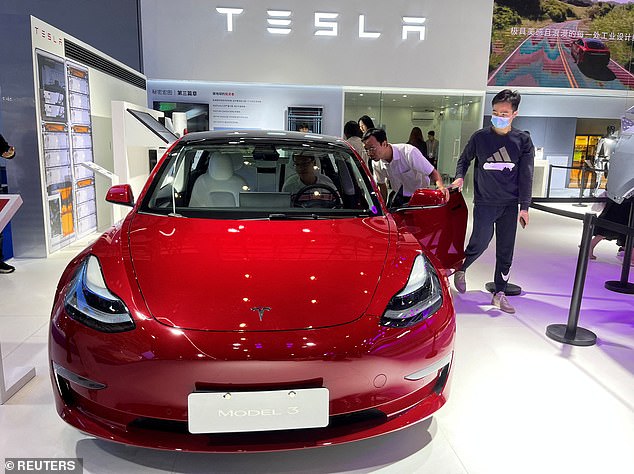‘Manly’ men won’t buy electric cars because they think it will dent their macho image, study claims
Electric vehicles (EVs) are often regarded as the future of transportation, and titans like Ford and Tesla are racing to make them.
But a new study finds that “more macho” men may not view it the same way, in the bizarre belief that EVs will damage their image.
Dr. Michael Parent, a researcher at the University of Texas at Austin (UT), claims that men who prioritize acting “like a real man” are more likely to reject electric-powered cars.
Instead, high-performance gasoline vehicles are the preferred sign of masculinity, he says, creating alarming and unexpected uncertainty about climate change efforts.
“It wouldn’t be a root cause of climate change, but it’s another, avoidable thing that adds to the pile of problems associated with climate,” Dr. Parent to MailOnline.
A US study claims that cisgender men who want to look like ‘real men’ hate electric cars (stock image)
While the problem can be addressed through advertising, it would probably be better if education addressed healthy gender role norms to reduce precarious masculinity in general.
“That’s linked to a wide range of negative behaviors, including sexism, homophobia, aggression and others.”
As part of his research, Dr. Parent explored the concept of “male contingency” among 400 men in the US.
Masculine contingency refers to the degree to which a person bases their self-esteem on cultural norms of masculinity, including toughness, status, and anti-femininity.
These perceptions can be real or imagined, with all participants asked to agree or disagree with a range of statements, including “I can’t respect myself if I don’t live up to what it means to be a ‘real man’.” ‘
The answers were then compared to car buying habits and attitudes, examining whether gas/diesel, hybrid or electric was preferred.
Nearly 40 percent of men considered electric cars to be the worst option, while many of these participants also held the most traditionally ‘masculine’ views.

Electric vehicles (EVs) are often regarded as the future of transportation as titans like Ford and Tesla (pictured) race to make them
“Good purchasing decisions for consumers are, to some extent, made with consideration for how those purchases reflect personal identity,” said Dr. Parent.
“The previous literature has suggested that EVs may be generally attractive to men in terms of their rapid acceleration and appeal as a technological innovation.
“Among men, however, approval of masculinity was linked to a decreased preference for EVs.”
These startling results come as countless auto giants race to develop new groundbreaking EVs amid heightened environmental concerns over typical fuel-powered engines.
New moves such as London’s Ultra Low Emission Zone (ULEZ) are also encouraging motorists to go electric, with a daily charge of £12.50 for non-emissions-compliant vehicles.
Despite his findings, Dr. Parent acknowledges that his research is limited, suggesting that there is no data showing a direct causal relationship between masculinity and attitudes toward EVs.
Car preferences were also based on hypothetical data rather than actual purchasing decisions, adding to the ambiguity of the results.
“It is likely that many men are susceptible to masculinity threats without being aware of it, and as such, experimental research in the consumer research precarious masculinity paradigm would be valuable,” he said.
“In conclusion, this study demonstrates a relationship between masculinity contingency and EV-related attitudes and purchase intentions, contributing to work on masculinity and consumer choices.”

